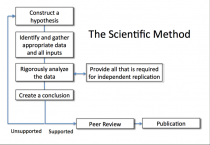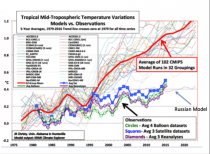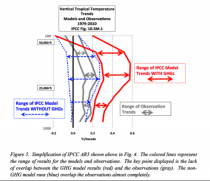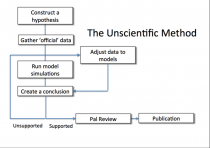By Joseph D’Aleo, CCM, AMS Fellow
See this excellent video from Tony Heller challenging the climate mafia and their continuing adjustment of data. No scientific method is being applied to the work of Government agencies and their cohorts like RSS.
THE SCIENTIFIC METHOD
The scientific method in science is a well established iterative process. The scientific method starts with a theory or hypothesis. The data needed to test it and all possible factors involved are identified and gathered. The data is processed and the results rigorously tested. The data and methods are made available for independent replication. Reviewers for the proposed theory must have the requisite skills in the topic and in the proper statistical analysis of the data to judge its validity. If it passes the tests and replication efforts, a conclusion is made and the theory may be turned into a paper for publication. If it fails the tests, the hypothesis or theory must be rethought or modified.
Astronomer Carl Sagan, Professor and Director of Cornell University’s Laboratory for Planetary Studies and host of the series Cosmos a Personal Voyage in a 1995 book The Demon-Haunted World: Science as a Candle in the Dark explained the scientific method and encouraged critical and skeptical thinking. He emphasized the importance of recognizing the difference between what is considered valid science and which is in reality pseudoscience.
Sagan like fellow Cornell physicist/lecturer Richard Feynman argued when new ideas are offered for consideration, they should be tested by means of skeptical thinking and should stand up to rigorous questioning. Feynman lectured;
“If a theory or proposed law disagrees with experiment (or observation), it’s wrong. In that simple statement is the key to science. It doesn’t make any difference how beautiful your guess is, it doesn’t matter how smart you are who made the guess, or what your name is.... If it disagrees with experiment, it’s wrong. That’s all there is to it.”
Sir Karl Popper, an Austrian-British philosopher and professor is generally regarded as one of the greatest philosophers of science of the 20th century. Popper is known for his rejection of the classical inductivist views on the scientific method, in favor of empirical falsification: A theory in the empirical sciences can never be proven, but it can be falsified, meaning that it can and should be scrutinized by decisive experiments.

Enlarged
It should noted a refutation of a previously accepted theory even one that has been published and widely accepted can follow the same route to review and publication as Albert Einstein observed:
The peer review process is failing due to political and economic pressures that have altered the scientific method to virtually ensure a politically correct or economically fruitful theory can never fail.
When the tests fail, instead of rethinking the theory or including other factors, there is an alarming tendency to modify input data to more closely fit the theory or models.
Also often, the authors and reviewers do not to have the proper understanding of all the factors involved and often the needed mathematical skills to properly evaluate the results. And even if they do, the input data and methods are generally not made available to the reviewers for replication. And in many cases, forecasts are made for many decades or even centuries into the future, so true validation is not possible, a luxury those of us who must forecast in shorter time frames (days to seasons) do not enjoy.
Also too often, the reviewers that then serve as final gatekeepers are often not only not fully capable of this kind of rigorous review, they are often biased and speed politically correct or economically beneficial work to publication while blocking or at least ‘slow walking’ work that challenges the so-called consensus science or their own often ideologically driven beliefs.
As Dr. Michael Crichton wrote “Let’s be clear: the work of science has nothing whatever to do with consensus. Consensus is the business of politics. In science, consensus is irrelevant. What is relevant is reproducible results. The greatest scientists in history are great precisely because they broke with the consensus. (Galileo, Newton, Einstein, etc)”.
SCIENTIFIC METHOD FAILURE IN THE CLIMATE SCIENCES
So when greenhouse climate models fail, they don’t revisit the theory but instead try and find the right data to fit that model. All data today is adjusted with models with a goal of addressing data errors, changes in location or instrumentation or addressing changing distribution or filling in for missing data or station closures. Once you start this adjustment process, it becomes increasingly possible to the find ways to mine from the data the desired results.
With the climate models there is an increasingly large divergence with balloon, satellite and surface reanalysis data sets the last 20 years. The one model that follows the temperature is a Russian model that has roughly half the greenhouse forcing and improved ocean modeling.

Enlarged
John Christy 2017 has shown models without greenhouse warming agreed perfectly with atmospheric (tropical) observations.

Enlarged
This kind of refutation should, if scientists abided by the scientific method, spark an effort to revisit the theory but that is too politically incorrect. This kind of ideologically or politically or economically driven thinking is pervasive across the sciences (atmospheric and medical).
EVIDENCE THAT TRADITIONAL PEER REVIEW IS FAILING
There is increasing proof that the traditional journal peer review process is broken. This is true in the Medical and Scientific areas.
See this example of one such falsified report that the author worries is a part of an epidemic of agenda-driven science by press release and falsification that has reached crisis proportions.
Other reports show an alarming number of papers having to be retracted. Springer is retracting 107 papers from one journal after discovering they had been accepted with fake peer reviews (here).
Result-oriented corruption of peer review in climate science was proven by the Climategate emails.
In the journals, there are a small set of gatekeepers that block anything that goes against the editorial biases of the journals. Conversely, these journals and their reviewers do not provide a thorough due diligence review of those that they tend to agree with ideologically. They are engaged in orthodoxy enforcement.
In an essay ”Has Science Lost its Way?”, Michael Guillen Ph.D wrote about Science’s reproducibility crisis.
For any study to have legitimacy, it must be replicated, yet only half of medical studies celebrated in newspapers hold water under serious follow-up scrutiny - and about two-thirds of the “sexiest” cutting-edge reports, including the discovery of new genes linked to obesity or mental illness, are later “disconfirmed.” Though erring is a key part of the scientific process, this level of failure slows scientific progress, wastes time and resources and costs taxpayers excesses of $28 billion a year, writes NPR science correspondent Richard Harris.
The single greatest threat to science right now comes from within its own ranks. Last year Nature, the prestigious international science journal, published a study revealing that “More than 70% of researchers have tried and failed to reproduce another scientist’s experiments, and more than half have failed to reproduce their own experiments.”
The inability to confirm research that was published in highly respected, peer-reviewed journals suggests something is very wrong with how science is being done.
The crisis afflicts even science’s most revered ‘facts,’ as cancer researchers C. G. Begley and Lee Ellis discovered. Over an entire decade they put fifty-three published “landmark” studies to the test; they succeeded in replicating only six - that’s an 11% success rate.
A major culprit, they discovered, is that many researchers cherry-picked the results of their experiments - subconsciously or intentionally - to give the appearance of success, thereby increasing their chances of being published.
“They presented specific experiments that supported their underlying hypothesis, but that were not reflective of the entire data set,” report Begley and Ellis, adding this shocking truth: There are no guidelines that require all data sets to be reported in a paper; often, original data are removed during the peer review and publication process’
Another apparent culprit is that - and it’s going to surprise most of you - too many scientists are actually never taught the scientific method. As graduate students, they take oodles of courses in their chosen specialty; but their thesis advisors never sit them down and indoctrinate them on best practices. Consequently, remarks University of Wisconsin-Madison biologist Judith Kimble: “They will go off and make it worse.”
This observation seems borne out by the Nature study, whose respondents said the three top weaknesses behind science’s reproducibility crisis are: 1) selective reporting, 2) pressure to publish, and 3) low statistical power or poor analysis. In other words, scientists need to improve on practicing what they preach, which is: 1) a respect for facts - all of them, not just the ones they like, 2) integrity, and 3) a sound scientific method.
The attendees of the so-called ‘Earth Day’ March for Science made a lot of noise about wanting more money and respect from the public and government - what group wouldn’t want that? But nary a whisper was heard from them or the media about science’s urgent reproducibility crisis. Leaving unspoken this elephant-sized question: If we aren’t able to trust the published results of science, then what right does it have to demand more money and respect, before making noticeable strides toward better reproducibility?
Michael Guillen Ph.D., former Science Editor for ABC News, taught physics at Harvard and author of “The Null Prophecy”.
FEEDBACK ON OUR RESEARCH REPORTS
Although well received and widely distributed, our recent press release and research paper hit a raw nerve with alarmists. The research sought to validate the current estimates of Global Average Surface Temperatures (GAST) using the best available relevant data. The conclusive findings were that the three GAST data sets are not a valid representation of reality. In fact, the magnitude of their historical data adjustments, which removed their cyclical temperature patterns, is totally inconsistent with published and credible U.S. and other temperature data.
Thus, despite current claims of record setting warming, it is impossible to conclude from the NOAA, NASA and UK Hadley CRU GAST data sets that recent years have been the warmest ever.
Finally, since GAST data set validity is a necessary condition for EPA’s CO2 Endangerment Finding, it too is invalidated by these research findings. This means that EPA’s 2009 claim that CO2 is a pollutant has been decisively invalidated by this research.
We had shown in prior research reports here and here how even if you ignore the adjustments, the changes observed can be explained entirely by natural factors (ocean cycles, solar cycles and volcanism). If one considers the urban heat island contamination of surface date, the idea that temperatures may actually be declining since the 1930s in cyclical fashion, very much in line with record highs.
The media fact checkers, which serve often as enforcers of orthodoxy, could not meaningfully question the data or science presented but challenged the claim that it was ‘peer reviewed’ (in the sense the peer review process has been defined today by the ‘advocacy’ journals’ (really ‘pal review’![]() .
.
Our research reports were rigorously peer reviewed by top scientists. The reports follow the approach long used in industry often for their own internal use. The reports were prepared by author teams with the requisite skills at proper data collection, a deep understanding of the scientific factors involved and statistical skills to evaluate what best explains the observed changes.
To abide by the scientific method, the work must be capable of being replicated. Our highly qualified reviewers who endorsed it are capable of evaluating the work scientifically and or statistically. They approval includes a willingness, even eagerness to endorse the work. The data and the methodology is available for others to replicate.
Our approach follows the long accepted application of the scientific method in a world where science is too politicized.





